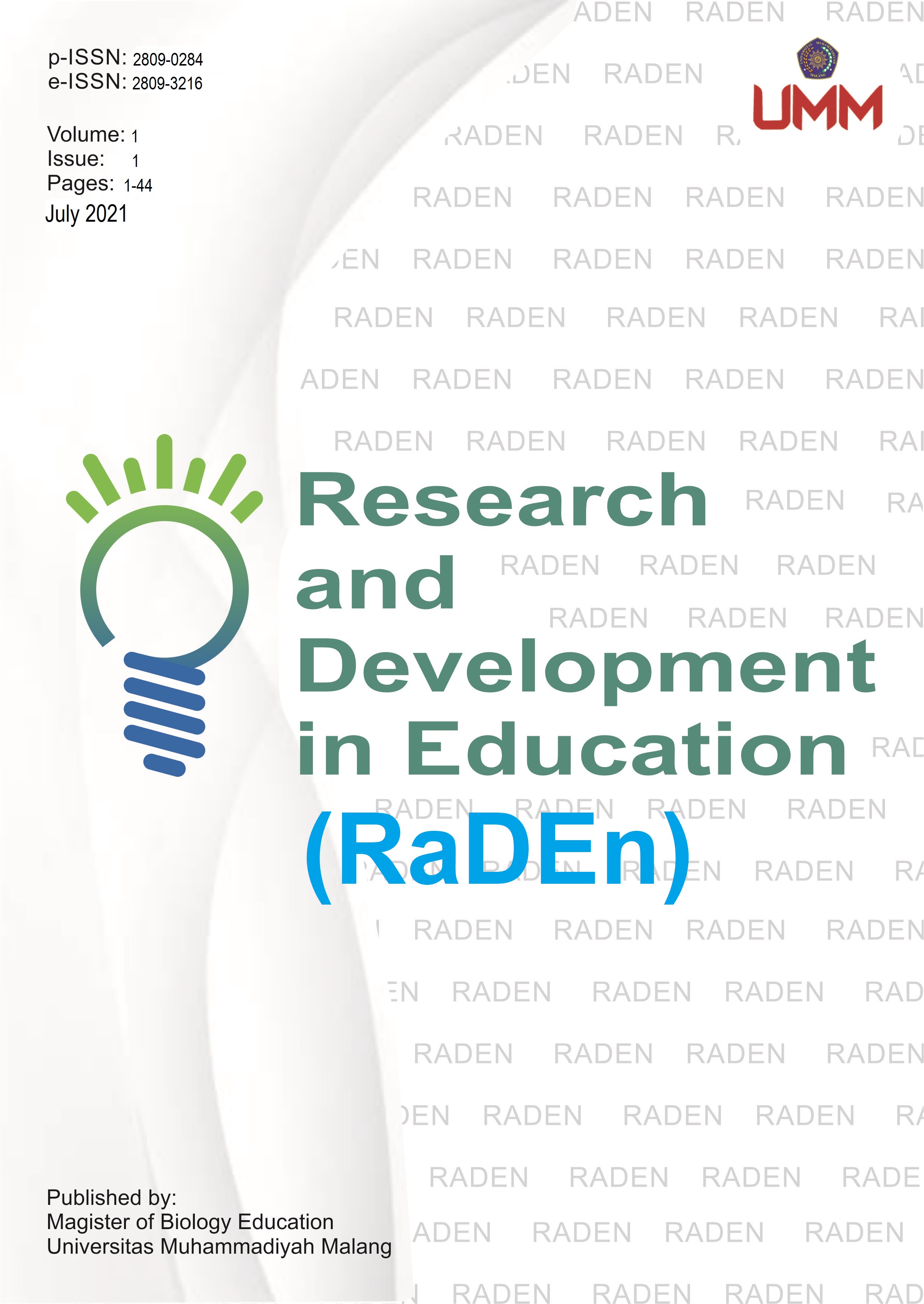Developing learning supplement book of Cell Mitotic Division material for Junior High School students
DOI:
https://doi.org/10.22219/raden.v1i1.18494Keywords:
ADDIE research, Cell mitotic, supplement bookAbstract
Cell division is an abstract material for middle school students in which learning resources and supporting learning media are compulsory to use. This research and development aimed at developing learning supplement book of mitotic cell material for IX graders which eases them to identify cell division, particularly in mitotic phase. This study was developed based on ADDIE model which comprised of four stages (i.e. Analysis, Design, Development, Implementation, and Evaluation). The validation test was conducted by teaching and learning material experts. The two stage tests were conducted in small and large trial groups. The qualitative and quantitative data gained were analyzed using percentage. The results showed that the percentage values were 86.2% (very feasible) for teaching material, 99.4% (very feasible) for learning material. The small-scale trial gained 87.8% (very feasible), meanwhile the large-scale test gained 88.3% (very feasible). In conclusion, the mitotic learning supplement book of cell division material for junior high school can be used as teaching material in classroom learning activities.
Downloads
References
Bowling, B. V., Acra, E. E., Wang, L., Myers, M. F., Dean, G. E., Markle, G. C., Moskalik, C. L., & Huether, C. A. (2008). Development and evaluation of a genetics literacy assessment instrument for undergraduates. Genetics, 178(1), 15–22. https://doi.org/10.1534/genetics.107.079533
Çimer, A. (2012). What makes biology learning difficult and effective: Students’ views. Educational Research and Reviews, 7(3), 61–71. https://doi.org/10.5897/ERR11.205
Dung, N. T., & Fatmawati, D. (2018). General informatics teaching with B-Learning teaching model. JPBI (Jurnal Pendidikan Biologi Indonesia), 4(1), 85. https://doi.org/10.22219/jpbi.v4i1.5312
Gormally, C., Brickman, P., & Lutz, M. (2012). Developing a Test of Scientific Literacy Skills (TOSLS): Measuring undergraduates’ evaluation of scientific information and arguments. CBE—Life Sciences Education, 11(4), 364–377. https://doi.org/10.1187/cbe.12-03-0026
Gulbinskienė, D., Masoodi, M., & Šliogerienė, J. (2017). Moodle as virtual learning environment in developing language skills, fostering metacognitive awareness and promoting learner autonomy. Pedagogika, 127(3), 176–185. https://doi.org/10.15823/p.2017.47
Heong, Y. M., Yunos, J. M., Othman, W., Hassan, R., Tee, T. K., & Mohamad, M. M. (2012). The needs analysis of learning higher order thinking skills for generating ideas. Procedia - Social and Behavioral Sciences, 59, 197–203. https://doi.org/10.1016/j.sbspro.2012.09.265
Hudha, A. M., Amin, M., Bambang, S., & Akbar, S. (2017). Study of instructional models and syntax as an effort for developing “OIDDE” instructional model. Jurnal Pendidikan Biologi Indonesia, 2(2). https://doi.org/10.22219/jpbi.v2i2.3448
Ilma, S., Superli, S., Zulfadli, Z., & Rupa, D. (2018). Developing poster based on diversity of Nepenthes in Padat Karya forest, Krayan Nort Kalimantan. JPBI (Jurnal Pendidikan Biologi Indonesia), 4(1), 67–74. https://doi.org/10.22219/jpbi.v4i1.5231
Irwan, Maridi, & Dwiastuti, S. (2019). Developing guided inquiry-based ecosystem module to improve students ’ critical thinking skills. JPBI (Jurnal Pendidikan Biologi Indonesia), 5(1), 51–60. https://doi.org/10.22219/jpbi.v5i1.7287
Lestari, R. (2014). Pengembangan media pembelajaran pembelahan sel dengan menggunakan Macromedia Flash untuk Kelas XII SMA. Jurnal Ilmiah Edu Research, 3(2), 133–138.
Maiyena, S., & Pinta, Y. (2014). Pengaruh penggunaan media film dokumenter harun yahya terhadap hasil belajar IPA siswa kelas X SMKN 1 Guguk [The influence of Harun Yahya documentary film media on students’ natural science learning outcomes of class X SMKN 1 Guguk]. Ta’dib, 17(1), 1–13. https://repo.iainbatusangkar.ac.id/xmlui/handle/123456789/13082
Minarno, E. B. (2001). Pembelajaran bioetika secagai pengawal perkembangan biologi modern dan penyelamatan lingkungan hidup. El–Hayah, 3(1), 35–40. https://doi.org/10.18860/elha.v3i1.2217
Muhaimin, M. (2015). Implementasi model pembelajaran berbasis masalah lokal dalam mengembangkan kompetensi ekologis pada pembelajaran IPS. SOSIO DIDAKTIKA: Social Science Education Journal, 2. https://doi.org/10.15408/sd.v2i1.1409
Rani, K. B., Widiyaningrum, P., & Ulung Anggraito, Y. (2020). Effectiveness of research based booklet media of conventional Biotechnology application as a supplement of Biotechnology teaching materials in Senior High School. JISE, 9(3), 295–300. http://journal.unnes.ac.id/sju/index.php/jise
Septiani, A., & Rustaman, N. Y. (2017). Implementation of performance assessment in STEM (Science, Technology, Engineering, Mathematics) Education to detect science process skill. Journal of Physics: Conference Series, 812(1), 012052. https://doi.org/10.1088/1742-6596/812/1/012052
Tang, T., Abuhmaid, A. M., Olaimat, M., Oudat, D. M., Aldhaeebi, M., & Bamanger, E. (2020). Efficiency of flipped classroom with online-based teaching under COVID-19. Interactive Learning Environments, 0(0), 1–12. https://doi.org/10.1080/10494820.2020.1817761
Downloads
Published
How to Cite
Issue
Section
License
Copyright (c) 2021 Syawalinda et al

This work is licensed under a Creative Commons Attribution-ShareAlike 4.0 International License.
Authors who publish with Research and Development in Education agree to the following terms:
- For all articles published in the Research and Development in Education, copyright is retained by the authors. Authors give permission to the publisher to announce the work with conditions. When the manuscript is accepted for publication, the authors agree to the automatic transfer of non-exclusive publishing rights to the publisher.
- Authors retain copyright and grant the journal right of first publication with the work simultaneously licensed under a Creative Commons Attribution-ShareAlike 4.0 International License that allows others to share the work with an acknowledgment of the work's authorship and initial publication in this journal.
- Authors are able to enter into separate, additional contractual arrangements for the non-exclusive distribution of the journal's published version of the work (e.g., post it to an institutional repository or publish it in a book), with an acknowledgment of its initial publication in this journal.
- Authors are permitted and encouraged to post their work online (e.g., in institutional repositories or on their website) prior to and during the submission process, as it can lead to productive exchanges, as well as earlier and greater citation of published work (See The Effect of Open Access).

This work is licensed under a Creative Commons Attribution-ShareAlike 4.0 International License.








